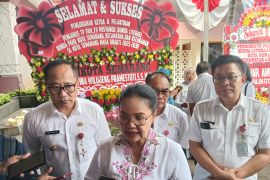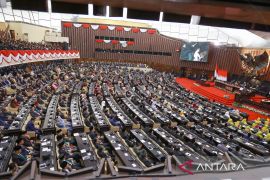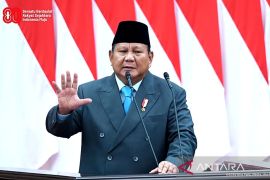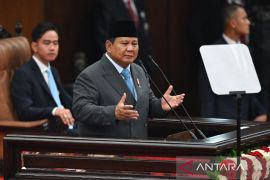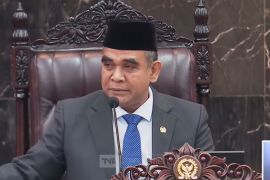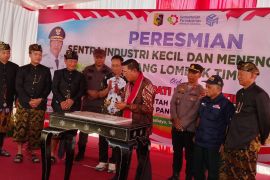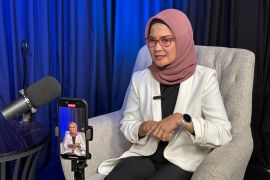Indonesian economy at present is ranked the 16th in the world,"Jakarta (ANTARA News) - Supported by various small and medium enterprises (SMEs) across the country, Indonesia is believed to have the potential to become the world`s fifth largest economy in the future.
Therefore the government has been paying special attention to the development of SME clusters which play an important role in the creation of jobs and in supporting economic growth.
Former Young Indonesian Businessmen Association (Hipmi) chairman Sandiaga S Uno said in Surabaya, East Java, on Sunday that since January until July 2011 the national economy has grown by 6.5 percent with the gross domestic product (GDP) reaching US$700 billion.
He said it was a promising achievement for the national economy, and with such a figure the economic growth in Indonesia would be able to exceed that of the Netherlands.
"Indonesian economy at present is ranked the 16th in the world," Sandiaga said, adding that in 2050 Indonesia could be the world`s fifth largest economic country.
According to him, the contribution to economic growth in Indonesia was dominated by the small and medium enterprises, and therefore all existing policies should support the SME`s economic condition.
Meanwhile Putera Sampoerna, the founder of Putera Sampoerna Foundation, has said the SMEs had been contributing to the Gross Domestic Product significantly.
According to him, the small and medium enterprises in Indonesia grew positively with an average of 2.69 percent per year in 2006-2008 period.
Based on the macro economic indicators of the SMEs of the Central Bureau of Statistics in 2009, the small and medium enterprises contributed more than Rp1.50 trillion, or 30.39 percent to to the gross domestic product.
Putera Sampoerna said the significant contribution was also apparent in the creation of employment opportunities by absorbing more than 83 million workers in 2008.
Therefore he said that through an initiative of the Mekar Entrepreneur Network with the cooperation of Bid Network an agreement had been reached to build BiDx to boost the growth and development of SMEs.
"As a business unit, BiDx manages an online platform to meet and build a network between businesspeople in the developing countries and mentors, partners and investors to share business experience and funding, wherever they are," he said.
He added that BiDx has a high target of funding at least 1,000 SMEs per year until 2016, and would create 8,500 workers and channel 25 million US dollars to small and medium enterprises.
In addition, House of Representatives` Commission-VI chairman Airlangga Hartarto said here over the weekend that Indonesia should have a strong economic resilience in the face of economic globalization of the ASEAN global market in 2015.
"To have strong economic resilience, Indonesia should have a lot of entrepreneurs," Airlangga said, adding that with many entrepreneurs, the Indonesia`s economic resilience would be getting stronger.
He said it was because the entrepreneurs would provide a great advantage to middle class people who did not rely on government budget.
"Of all Indonesian citizens, only 0,24 percent are successful entrepreneurs, and therefore Indonesia still needs millions more to make the country`s economic resilience stronger," Airlangga said.
According to him, the potential for entrepreneurial development in Indonesia with around 240 million people was high enough.
He said Indonesia has strong social system so it could create more entrepreneurs because the people wanted to do anything to survive.
"To survive as entrepreneurs in the fields of trade and service needs less capital," Airlangga said.
He said that to create more entrepreneurs from education and practical experiences, the government should give strong support by protecting the small-scale business players.
Airlangga admitted that the small-scale entrepreneurs at present have difficulty to progress because of unhealthy business competition.
For example, he pointed out that the traders at flea markets or small kiosks were forced to compete tightly with flourishing mini markets and super markets which had big capital.
"Therefore, the system should be improved in order to realize a healthier business competition," Airlangga said.
Meanwhile, Coordinating Minister for Economy Hatta Rajasa said here on Friday that investment was expected to become an engine of Indonesia`s economic growth in the future.
Hatta Rajasa said that if it happened, the people would no longer depend on household consumption.
"Growing nearly double-digit over some 20 percent, the investment at present is very strong and can become an engine of the country`s economic growth in the future," Hatta said.
Besides expecting contribution from household consumption, Hatta also wanted the export sector could be another contributor to economic growth.
"Net growth of exports and imports is also high. The growth of 17.5 percent in the second semester, the import dropped by 15 percent so the trade balance remains surplus," Hatta said.
According to him, the government would also improve the growth of manufacture sector or processing industry which in the second semester reached 6.1 percent.
"You see the manufacture sector is expanding by 6.1 percent because of the entry of oil and gas, and the second is that the agriculture, mining, telecommunication, and transportation sectors are all positive," Hatta said.
He added that the strong economic growth, expected to reach 6.5 to 7 percent in 2012 would also be supported by budget management with more precise target.
"We have to expand the capital spending by maintaining the budget deficit," he said.
According to the Central Bureau of Statistics (BPS), year-over-year (yoy) economic growth in the second semester of 2011 reached 6.5 percent. (*)
Reporter: Otniel Tamindael
Editor: Aditia Maruli Radja
Copyright © ANTARA 2011


